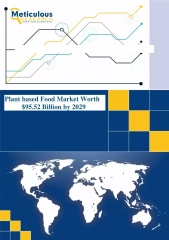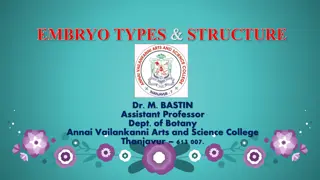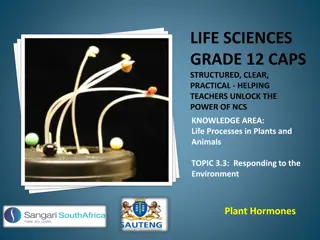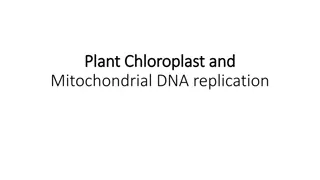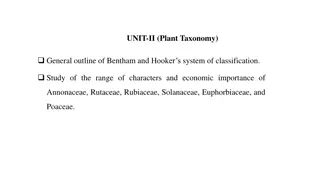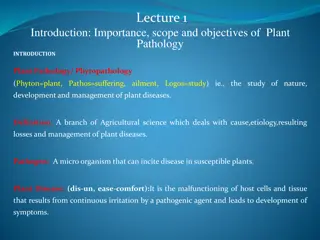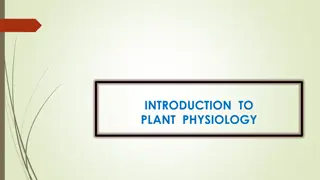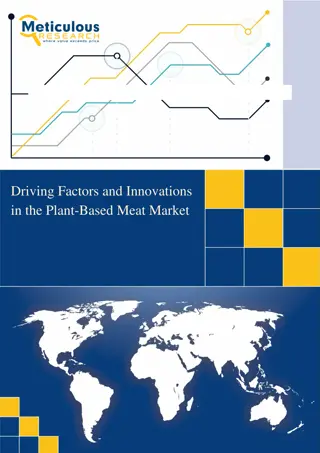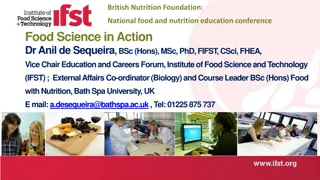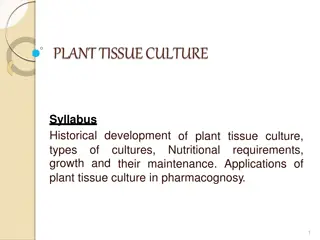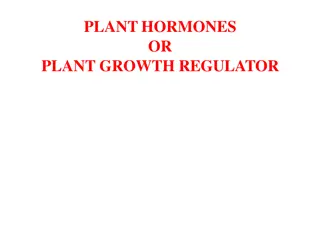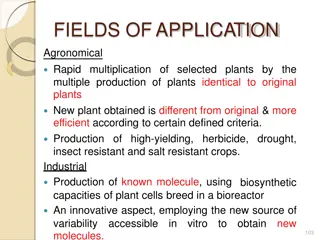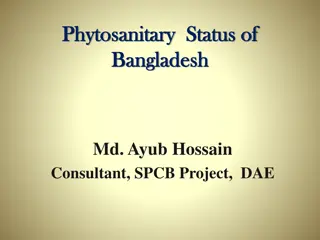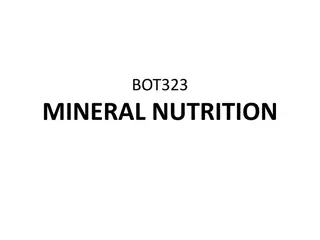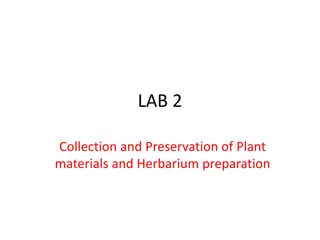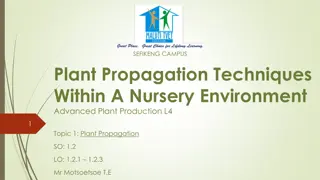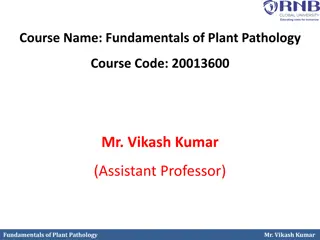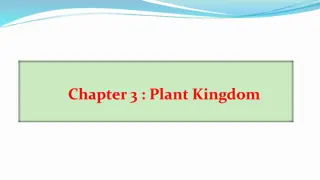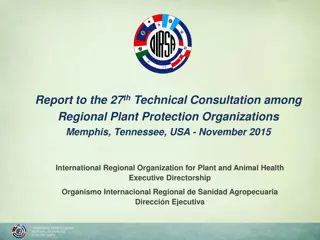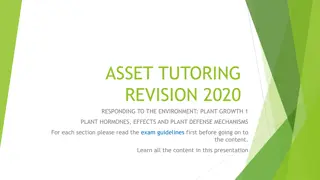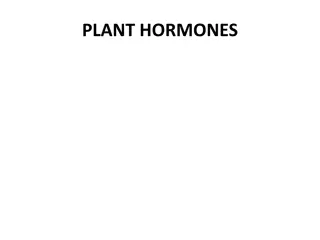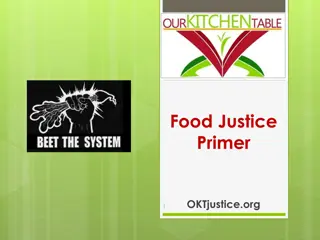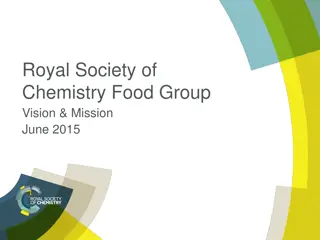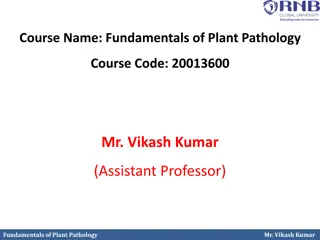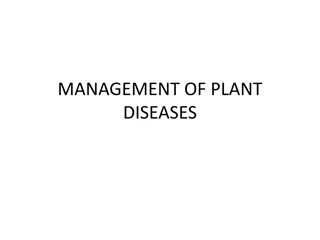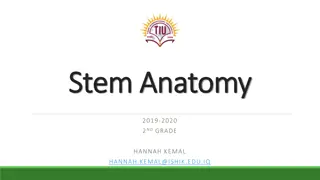Unit 1: Introduction and History of plant pathology
The science of plant pathology, which studies plant diseases and aims to protect the food supply by improving plant survival in unfavorable conditions. Explore the causes of plant diseases, their symptoms, and methods of prevention and control.
5 views • 13 slides
Amway Nutrilite All Plant Protein Powder 1kg Deutsche Post AG
Amway Nutrilite All Plant Protein Powder is a premium source of protein derived from plant-based ingredients. With each serving, you get a blend of high-quality protein to support your active lifestyle and dietary needs.\nAmway Nutrilite All Plant Protein Powder offers a convenient way to supplement
1 views • 4 slides
Plant-Based Food Market - Size, Growth, Trends, Share
the Global Plant-Based Food Market is expected to grow at a CAGR of 12.4% from 2022\u20132029 to reach $95.52 billion by 2029. The growth of this market is driven by factors such as the increasing intolerance for animal protein amongst consumers, the growing vegan population, and the rising number o
1 views • 5 slides
How are plant essential oils valuable as functional ingredients
Food Research Lab is one of the leading food industry consultants and offers various food production services. We provide food production and food manufacturing consultancy services to food, beverage and nutraceutical companies. Primary food production involves everything from food procurement, inve
8 views • 12 slides
Understanding Plant Embryogenesis: A Comprehensive Overview
Plant embryogenesis is a crucial process in the development of plant embryos from fertilized ovules, involving cell division, differentiation, and morphogenesis. This process leads to the formation of seeds, which play a vital role in the plant life cycle. The stages of embryo formation, structure,
0 views • 25 slides
Understanding Plant Tissue Culture: Methods and Requirements
Plant tissue culture involves the in-vitro culture of plant explants under aseptic conditions, covering cell, organ, and suspension cultures. This process, pioneered by German botanist Gottlieb Haberlandt, relies on the totipotency of plant cells. Key requirements include laboratory organization, su
0 views • 18 slides
Understanding Plant Hormones and Their Functions in Plants
Plant hormones play crucial roles in various plant processes such as growth, development, and response to environmental stimuli. Auxins, gibberellins, and abscisic acid are key plant hormones that regulate tropisms, cell division, elongation, flowering, seed germination, and dormancy. Understanding
1 views • 50 slides
Plant Mitochondrial and Chloroplast DNA Replication Mechanisms
Plant mitochondria and chloroplasts have intricate DNA replication processes. Mitochondrial DNA replication is independent of the plant cell cycle and is associated with specific proteins in nucleoid complexes. Plant mtDNA contains more genes than animal mtDNA, with a complex structure involving int
1 views • 16 slides
Overview of Bentham and Hooker's Classification System in Plant Taxonomy
Bentham and Hooker's system of classification in plant taxonomy, outlined in Genera Plantarum, provided detailed descriptions of families and genera based on original plant dissections. This classification system has practical value for plant identification, with keys for taxa and subdivisions for l
2 views • 47 slides
Understanding Plant Tissue Culture Media and Their Importance in In Vitro Growth
Plant tissue culture media play a crucial role in the in vitro growth and morphogenesis of plant tissues. The composition of culture media depends on the specific plant species and the type of material used for culture. Various types of media, such as White's medium, MS medium, B5 medium, N6 medium,
0 views • 6 slides
Understanding Plant Pathology: Importance, Scope, and Objectives
Plant pathology, also known as phytopathology, is the study of plant diseases and their management. It covers the causes, symptoms, and impact of pathogenic organisms on plants. The field aims to understand the interactions between plants and pathogens, develop control methods, and reduce losses in
0 views • 6 slides
Food Equipment Usage Guidelines for Safe Food Handling
Enhance your knowledge on using equipment for making food with proper safety procedures. Learn about essential points like wearing protective gear, checking hot food temperatures, food safety principles, and sanitization requirements. Understand machine settings, food temperature checks, and serving
1 views • 22 slides
Introduction to Plant Physiology: Exploring the Functioning of Plants
Plant physiology is a crucial subdiscipline of botany that delves into the processes and functions operating within plants. This field closely examines areas like plant morphology, ecology, cell biology, and genetics, shedding light on vital processes such as photosynthesis, respiration, and more. T
1 views • 7 slides
European Standards for Plant Biostimulants Development
The European Committee for Standardization (CEN) plays a crucial role in developing European standards for plant biostimulants, focusing on improving plant nutrition processes independently of nutrient content. The CEN/TC.455 committee is responsible for creating standards supporting the EU Fertilis
2 views • 5 slides
National Food Reserve Agency (NFRA): Enhancing Food Security in Nigeria
The National Food Reserve Agency (NFRA) under the Federal Ministry of Agriculture & Water Resources plays a crucial role in addressing agricultural production, storage, and marketing challenges in Nigeria. With a vision to ensure sustainable food access for all Nigerians and become a global food pro
1 views • 30 slides
Plant based meat market 4
The changing lifestyles and an increasing number of health-conscious consumers are increasing the popularity of plant-based meat products, positively impacting the demand for plant-based meat. The growth of the plant-based meat market is mainly attri
1 views • 4 slides
Understanding Plant Tissue Culture: Techniques and Applications
Plant tissue culture involves maintaining and growing plant cells, tissues, or organs in artificial mediums under controlled conditions. It allows the regeneration of whole plants from small plant parts or cells. Hormones like auxins, cytokinins, and gibberellins are used in the process. Proper envi
3 views • 5 slides
Exploring Food Science and Technology in Modern Society
Delve into the world of food science and technology with insights on what scientists do, the importance of understanding food, definitions of food science and food technology, factors affecting food spoilage, and traditional and modern food processing technologies. Gain knowledge on testing hypothes
0 views • 22 slides
Plant Tissue Culture: Historical Development, Techniques, and Applications
Plant tissue culture is an experimental technique that involves the in-vitro cultivation of plant cells to produce secondary metabolites, regenerate plants, and study organogenesis. This process allows for the maintenance of disease-free plant material, biosynthetic pathway tracing, and cell immobil
0 views • 21 slides
Understanding Plant Meristems and Growth Patterns
Explore the fascinating world of plant meristems, the small clumps of cells responsible for elongation of roots and shoots, as well as the different types of primary meristems and their roles in plant growth. Learn about apical and lateral meristems, primary tissues, and the organization of the plan
0 views • 33 slides
Understanding Plant Hormones and Growth Regulators
Plant growth regulators, also known as plant hormones, play a crucial role in regulating growth and development in plants. They are organic compounds that act at low concentrations to promote, inhibit, or modify growth processes. The main plant hormones include auxins, cytokinins, gibberellins, absc
1 views • 40 slides
Plant Tissue Culture Methods for Growth and Reproduction Study
Plant tissue culture methods such as root tip culture, shoot-tip culture, leaf culture, flower culture, and anther and pollen culture allow for the study of growth, reproduction, and genetic variations in plants. These techniques involve culturing various plant parts under sterile conditions to inve
1 views • 20 slides
Plant Tissue Culture Applications in Agriculture and Biotechnology
Plant tissue culture technology is a versatile tool used in agronomy and biotechnology for rapid multiplication of selected plants, production of high-yielding, herbicide, drought, insect, and salt-resistant crops, as well as the generation of phytopharmaceuticals, secondary metabolites, and novel c
0 views • 17 slides
Understanding Plant Quarantine and Phytosanitary Measures
Plant quarantine involves efforts to prevent the entry, establishment, or spread of foreign pests through legal restrictions on plant and plant product movement. It is crucial for safeguarding plant health, food production, and ecosystems. Phytosanitary measures aim to ensure the health of plants by
0 views • 33 slides
Understanding Mineral Nutrition in Plants
Mineral nutrition in plants involves the acquisition of essential elements in the form of inorganic ions from soil, followed by their absorption and utilization in various plant processes. Around 60 different elements have been reported in plants, with 30 being essential for plant growth. These esse
0 views • 39 slides
Plant Collection and Preservation Techniques
Explore the process of collecting and preserving plant materials for herbarium preparation. Learn about the importance of plant documentation, including dry and wet preservation methods. Understand why plant collection is crucial for systematics studies and serving as a reference collection for name
0 views • 25 slides
Plant Propagation Techniques in Nursery Environment
Learn about plant propagation techniques within a nursery environment, including nursery operations, potting seedlings, plant protection, weed control, packing of nursery plants, and crafting tissues for plant growth. Explore the essential tasks involved in nurturing seedlings and trees before they
0 views • 17 slides
Understanding Plant Pathology: Reproduction and Classification of Bacteria
This course on Fundamentals of Plant Pathology, led by Mr. Vikash Kumar, covers essential topics such as disease identification, pathogen nature, disease management strategies, pathogen classification, and plant disease diagnosis. It delves into the reproduction and classification of plant pathogeni
0 views • 16 slides
Mastering Good Food Hygiene and Storage Practices
Understanding food spoilage causes, common food-poisoning bacteria, conditions for bacterial growth, ways to prevent food contamination, safe food handling practices, HACCP concept, types of perishable foods, importance of proper food storage, packaging materials for food, and recognizing signs of f
1 views • 27 slides
Plant Kingdom Diversity and Characteristics
Explore the intriguing world of the plant kingdom through topics like classification by notable scientists, gamete characteristics in Phaeophyceae, unique features of Bryophytes, and the significance of Bryophytes as the amphibians of the plant kingdom. Delve into the structures and functions of pla
0 views • 21 slides
Plant Health Initiatives at the 27th Technical Consultation Among Regional Plant Protection Organizations - Memphis, Tennessee
The 27th Technical Consultation in Memphis, Tennessee focused on plant health initiatives by the International Regional Organization for Plant and Animal Health. OIRSA emphasized four key technical areas: plant health, animal health, agricultural quarantine, and food safety. Projects included addres
0 views • 13 slides
Plant Growth Hormones and Defense Mechanisms: Understanding Plant Responses to the Environment
Plant growth hormones and defense mechanisms play crucial roles in how plants respond to environmental stimuli such as water, sunlight, gravity, and more. From auxins promoting cell growth to gibberellins stimulating flowering, this presentation educates on the intricacies of plant hormones and thei
1 views • 13 slides
Understanding Plant Hormones and Their Role in Growth and Development
Plant hormones are vital compounds that regulate various processes in plant growth and development. They are mostly organic and can be gases. These hormones are produced in one part of the plant and transported to other parts where they induce physiological effects. The main phytohormones include Au
0 views • 125 slides
Understanding Food Justice and Insecurity: A Comprehensive Overview
Food Justice Primer provides insightful definitions and discussions on key concepts such as food justice, food insecurity, food sovereignty, and food deserts. It highlights the need for equitable sharing of benefits and risks in the food system, aiming to transform current disparities and inequities
0 views • 49 slides
Food Sufficiency and Barriers to Free Food Access Among Working-Age Persons with Disabilities Before and During COVID-19 Pandemic
Working-age persons with disabilities face economic vulnerability and higher chances of living in food-insecure households. This study explores food sufficiency and barriers to accessing free food during the COVID-19 pandemic. Data was collected through an online survey, revealing insights into food
1 views • 14 slides
Royal Society of Chemistry Food Group Vision & Mission Summary
The Royal Society of Chemistry Food Group aims to lead, promote, and disseminate the understanding and importance of chemistry in food. Their vision is to enhance food and nutrition security through advancing the chemistry of food ingredients. They strive to engage with various communities to promot
0 views • 4 slides
Exploring the Fundamentals of Plant Pathology: Understanding Viruses in Plant Diseases
Delve into the world of plant pathology with Mr. Vikash Kumar, as you learn about the nature, structure, and transmission of viruses affecting plants. Explore the important characteristics of plant viruses, their unique properties, and how they interact within plant cells. Gain insights into viral d
0 views • 14 slides
Overview of Plant Quarantine and Disease Management
Plant quarantine is a crucial practice that involves regulating the movement of plants and plant products to prevent the spread of pests and diseases. Originating with the first law in France in 1860, plant quarantine now encompasses various methods such as embargoes and inspections to safeguard pla
0 views • 11 slides
Insights into Whole Food Plant Based Diet Trends and Statistics
Explore the growing popularity of Whole Food Plant Based (WFPB) diets among Millennials, the increasing demand for plant-based milk versus cow's milk, and the abundance of protein sources in plant-based foods. Arm yourself with information to advocate for the benefits of a WFPB diet with facts on ve
0 views • 12 slides
Understanding the Anatomy and Functions of Plant Stems
Plant stems play a crucial role in the growth and survival of plants. They transport water, minerals, and sugars, support leaves and flowers, and store food. The outer structures of stems, such as buds and nodes, are essential for plant growth. Furthermore, the tissues inside the stem, including xyl
0 views • 12 slides


